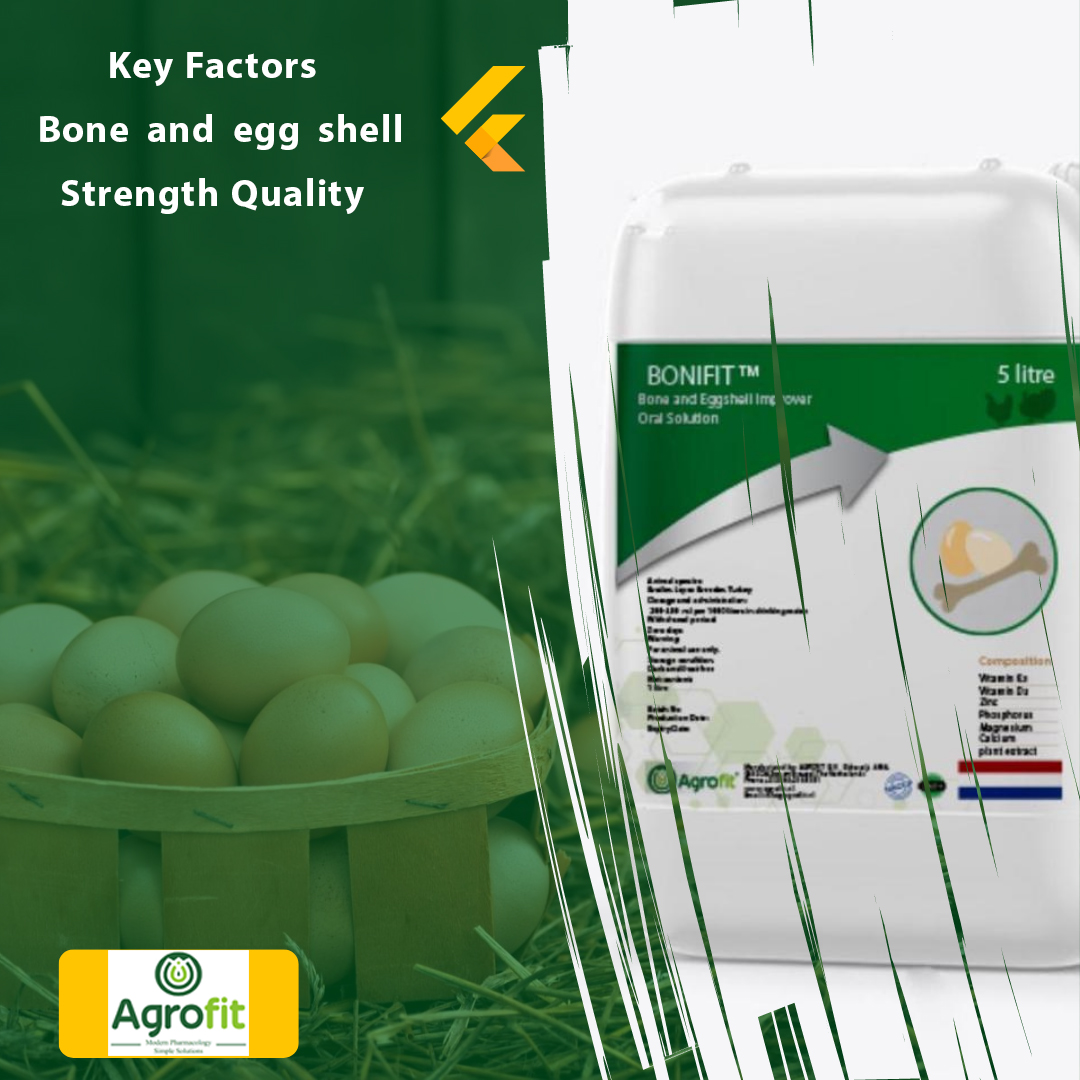
Key Factors Bone and egg shell Strength Quality
Weak, thin, or soft chicken eggshells can lead to loss of eggs and income, deformities in chicks, and other difficulties. There are several reasons why shell strength may degrade, and different ways to prevent it to ensure the most productive laying hens.
There can be several causes behind weak chicken eggs. While any hen might have an occasional soft egg and infrequent weak eggshells are nothing to be concerned about, if a hen is laying soft eggs regularly or with noticeably increasing frequency, she may be suffering from any of these conditions.
Overproductie: Als een hen te snel te veel eieren legt, legt ze waarschijnlijk meer zachte eieren. Het duurt ongeveer 24 uur voordat een eierschaal zich goed in de eileider van de vogel heeft afgezet, en sneller leggen betekent zwakkere eierschalen.
Poor Nutrition: An inadequate diet can lead to poor eggshell formation. This may be a problem such as low calcium intake or could simply be less feed, especially on hot days when hens lose their appetites and may not take in enough nutrition to create sturdy eggs.
Hormone Deficiency A hen with hormone imbalances may lay eggs with thinner or softer shells. This is especially common as hens age and reach the end of their most productive egg-laying years.
Stress: A very stressed hen may have problems laying strong eggs. Whether the stress is from flock bullying, the presence of predators, moving to a new coop, or other causes, the hen’s laying productivity and egg strength can be impacted.
Thyroid Dysfunction: If a hen’s thyroid (a gland near the base of her neck) isn’t functioning properly, her ability to absorb calcium is compromised and she may not be able to lay eggs with stronger, thicker shells.
Molting: When hens go through their regular molts, their body’s nutrition is directed toward growing new, strong feathers to replace those that are shed. As a result, thinner or weaker eggshells are common during molting periods.
Ammonia Poisoning: Excess ammonia (from unclean coops and feces buildup) inhibits a hen’s ability to absorb calcium and properly form eggshells. Ammonia poisoning may come from airborne ammonia or contamination of food or water.
Dehydration: Simple dehydration can impact a hen’s laying ability and lead to softer eggs because of decreased metabolism and inability to absorb the appropriate nutrients from feed in order to form the strongest eggshells.
Illness: If a hen is sick with a virus or bacterial infection or just with a simple wound, her body will direct its energy toward that healing. This can compromise eggshell production and lead to temporarily softer or weaker shells.
several Ways to Increase Shell Strength in Chicken Eggs
Because there are many different possible causes of weak chicken egg shells, it is important to consult a veterinarian for a proper diagnosis. If the bird is injured or has nutritional deficiencies, the vet can recommend appropriate treatments and supplements or medication as necessary. Other options for increasing shell strength in chicken eggs include…
Improving Diet: A healthier diet will naturally lead to healthier, stronger eggs. Depending on individual hen’s nutritional needs and the composition of the feed, more protein, calcium, or Vitamin D can be helpful for improving egg shell strength.
Offering Supplemental Calcium: Providing an extra source of calcium, such as calcium-enriched grit, can help hens get enough of this essential mineral. Dark, leafy greens offered as enrichment forage can also be a great source of calcium.
Lowering Stress: If the flock has been stressed, that can cause hormone imbalances and anxiety that affects hens’ laying abilities. Reducing stress by reducing overcrowding, keeping pets from agitating the birds, and ensuring there are no predators can help soothe hens.
Keeping Cool: Taking steps to keep chickens cool during the hottest months can improve egg quality. Extra ventilation, abundant fresh water, positioning the coop in shade, and providing ice blocks for enrichment can all help keep hens cool when temperatures rise.
Improving Overall Health: Ensuring hens are healthy overall is always good for laying productivity and strong eggs. Keep birds at the proper weight, provide suitable enrichment, offer nutritious feed, and take other steps for a wholly healthy flock.
Medication: If an individual hen has thyroid or other hormone problems, or may have an injury or infection, appropriate medication can speed her healing and improve egg quality. Consult a veterinarian for the right diagnosis and specific treatment options.
Cleaning the Coop: A cleaner coop will be a healthier, lower stress living environment for all the hens. Removing excess feces regularly will lower ammonia levels, and improved ventilation will keep the birds more comfortable for the best egg laying.
Provide Plenty of Water: Not only do hens need an abundant source of water, that water should be as fresh and clean as possible. Creating several watering stations can ensure all hens have good access to the water without crowding or stress.
Bonifit, a Key Factor Bone and egg shell Strength Quality
By strengthening the bone structure, this product increases the calcium storage capacity in the animal. the strength of the Bone is clearly increased.
Bonifit is a combination of original sources of highly assimilable calcium, and precursors of the osseous matrix.
For more information, Refer to the products section on the site.
